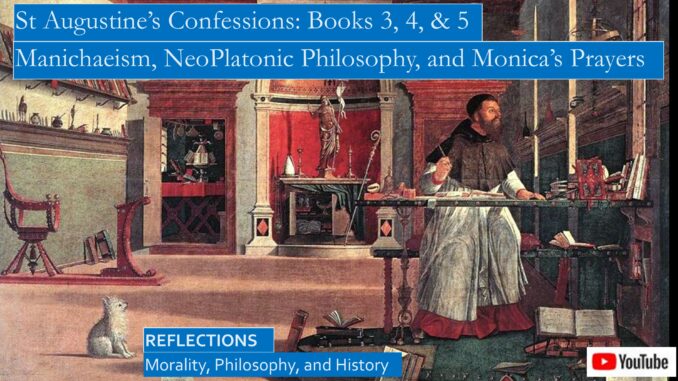
Why should we reflect the young St Augustine’s budding career in Rome, Milan and Carthage as he describes in Books 3, 4, and 5 of his spiritual autobiography, the Confessions?
Why did young Augustine initially turn his back on his mother Monica’s Catholic faith in his youth, joining the Manichean heresy?
Why was young Augustine enthralled in Cicero’s Hortensius, which described true philosophy as the search for wisdom? What part did Cicero and the NeoPlatonists play in his decision to reject the teachings of the Manichees?
What other factors led young Augustine to reject the Manichean teachings?
These books of the Confessions are an autobiography of his soul rather than his life, he mines innocuous incidents for spiritual truths. St Augustine often does not reveal the details of an event in his life, he concentrates on how it influences his evolving beliefs.
YouTube Video: Confessions of St Augustine, Youth and Adolescence, Books 1 and 2
https://youtu.be/gdK1a3AbI9w
St Augustine’s Confessions: Manichaeism, NeoPlatonic Philosophy, and Monica’s Prayers, Books 3, 4, and 5
https://youtu.be/ydskqlgZSrE
St Augustine’s Confessions: Mother Monica, Concubine, Marriage, and Philosophy, Books 6 & 7
https://youtu.be/AjGbBozIReY
St Augustine’s Confessions, His Conversion, Baptism, St Monica’s Death, and Philosophy, Books 8 & 9
https://youtu.be/Vijtjxm3Ta0
St Augustine’s Confessions, Memory, Soul and Mind Book 10
https://youtu.be/xTHmGhGG6Bk
St Augustine’s Confessions, Time, Creation Genesis, Pagan Myths, and Manicheism Books 11, 12, and 13
https://youtu.be/Ff-XsE5CuSo
SUMMARY OF YOUTH AND SPIRITUAL STRUGGLES OF YOUNG AUGUSTINE
The Confessions were written soon after St Augustine was drafted to be the co-bishop of Hippo, near Carthage. The Confessions are not only a confession of faith and a confession of sin and sinful longings, but also a mirror into his soul, exploring his innermost motivations, and thus are included in many introductory psychology courses as one of the first explorations of our subconscious drives. The style is unique, Bishop Augustine addresses his Confessions as a prayer to God, addressing God directly, imbedding verses of Scripture and the Psalms directly into his Confessions as he writes these words on his soul.
In the first two chapters of his Confessions, St Augustine reflects on:[1]
- His birth, youth and his spiritual development under his Christian mother Monica and his pagan father Patricius.
- Speculations on the hidden spiritual and psychological motivations of infants and young children, with theories on how children learn language.
- How the Original Sin of Adam and Eve may affect the behavior of infants and children, and all Christians.
- How the incident where young Augustine and his gang of youngsters stole many pears from a neighbor’s orchard, and how this was a reflection of the Original Sin of Adam and Eve eating the forbidden fruit in the Garden of Eden.
ADOLESCENCE AND EARLY CAREER OF YOUNG AUGUSTINE
St Augustine was born in 354 AD at Thagaste, deep in the interior of North Africa in today’s Libya. The Sahara desert has slowly been expanding for thousands of years, fifteen hundred years ago, during the life of St Augustine, much of current Libya was the arid breadbasket whose grain helped feed the people of Rome. Young Augustine’s parents knew the potential of their brilliant son and sacrificed to send him to school in Carthage.
Bishop Augustine remembers how the hormones rage in all young male adolescents, and how many of us seek romance and affection:
“I went to Carthage where I found myself in the midst of a hissing cauldron of lust. I had not yet fallen in love, but I was in love with the idea of it, and this feeling that something was missing made me despise myself for not being more anxious to satisfy the need. I began to look around for some object for my love, since I wanted badly to love something. I had no liking for the safe path without pitfalls, for although my real need was for you, my God, who are the food of my soul, I was not aware of this hunger.”
St Augustine continues, “To love and have my love returned was my heart’s desire, and it would be all the sweeter if I could also enjoy the body of the one who loved me. So, I muddied the stream of friendship with the filth of lewdness and clouded its clear waters with hell’s black river of lust.” “My love was returned and finally shackled me in the bonds of its consummation. In the midst of my joy, I was caught up in the coils of trouble, for I was lashed with the cruel, fiery rods of jealousy and suspicion, fear, anger, and quarrels.”[2]
Many modern readers criticize St Augustine for what seems today to be overly strict Victorian teachings on relationships, intimacy, and concupiscence. Actually, his views were moderate when compared to the views of the Stoic philosopher Musonius Rufus. Ancient and medieval theology had to be stricter, as intimacy had far more dire consequences. Today women rarely die in childbirth, but the percentage of women dying in childbirth in the ancient world was so high that, Roman aristocratic wives often updated their wills when the discovered they were pregnant. Likewise, infant mortality was also sky-high in the ancient world, only half of children survived to adulthood, and only one in ten survived to old age.
St Augustine and Musonius Rufus on Concupiscence: https://youtu.be/-wv6bVeG74A
Ordinary Life in Ancient Greece: https://youtu.be/vl8KGL5Yx2w
In Book 4, St Augustine remembers the time he spent with his concubine, he was faithful to her for over a decade, and she gave birth to his son, whom they named Adeodatus, Lover of God. In Book 6 he reluctantly puts away his beloved concubine and plans to marry a young Christian girl, not for love, but for money and political advancement. He regrets the crass cruelty of this decision, as both he and his mother Monica, who arranged this marriage to advance his career, were both lingering close to the gates of Babylon in this matter.
St Augustine prays to God that the “love you bear for our souls and the compassion you show for them are pure and unalloyed, far purer than the love and pity which we feel ourselves.” While St Augustine was lost, wandering far from his heavenly home, like the prodigal son, mired deep in his sins of lust and depravity and heresy, all this time the mercy of God hovered faithfully over him.”[3]
YOUNG AUGUSTINE DISCOVERS TRUE PHILOSOPHY SEEKING WISDOM
Books and learning drive St Augustine’s spiritual development, following the accepted cultural norms was not enough, he needed to seek and experience for himself true virtue and wisdom. St Augustine discovered Cicero’s book the Hortensius, it recommends the reader to study philosophy to improve his soul, to discover true wisdom. Alas, this key book, which was a part of the schoolboy’s curriculum, has been lost in the sands of history, may we all pray that someday it will be found in the dusty shelves of an ancient monastery somewhere.
St Augustine remembers, “Cicero’s Hortensius altered my outlook on life. It changed my prayers to you, oh Lord, and provided me with new hopes and aspirations. All my empty dreams suddenly lost their charm, and my heart began to throb with the bewildering passion for the wisdom of eternal truth!” “How I burned with longings to have wings to carry me back to you, away from all earthly things! However, I had no idea what you would do with me! For yours is wisdom. In Greek, the word philosophy means love of wisdom. It was with this love that Hortensius inflamed me.”
St Augustine continues, “There are people for whom philosophy is a means of misleading others,” “and Cicero shows them up in their true colors and makes quite clear how wholesome is the admonition” of “St Paul: ‘Take care not to let anyone cheat you with his philosophizing, with empty fantasies grown from human tradition, from worldly principles; they were never Christ’s teaching. In Christ the whole plenitude of Deity is embodied and dwells in him.’”[4]
Rather, Cicero advises us “not simply to admire one or another of the schools of philosophy, but to love wisdom itself, whatever it might be, and to search for it, pursue it, hold it, and embrace it firmly.” Cicero studied and adopted elements of philosophy mainly from the Roman Stoic philosophers, including Epictetus, Musonius Rufus, Seneca, and Marcus Aurelius, but also from the Skeptic, Epicurean, and Platonic and NeoPlatonic philosophers, and likely was acquainted with the writings of Aristotle.[5]
YouTube: https://youtu.be/Dhd543kov-E and https://youtu.be/m4mcP2F9c4w and https://youtu.be/0qHpReZYhv4 and https://youtu.be/49Qv3Be86Jw
In his Teaching Company lecture on St Augustine, Professor Phillip Cary states that:
“Philosophy is a form of love, the love of seeking wisdom. The primary goal of neoPlatonic philosophy in the days of St. Augustine is the seeking of true happiness. We don’t seek this happiness for the sake of something else, this is the final goal of our lives, the ultimate final happiness that will not fade away, the happiness that is eternal.
Who will make us eternally happy? What will make us eternally happy? This happiness that will not last. The ultimate source of eternal happiness is God, our God who is Love, and the Love of God is what will make us eternally happy. If we seek happiness in the things of this world, we will only find fleeting happiness, the happiness that will not last.”[6]
WHY DIDN’T YOUNG AUGUSTINE ADOPT THE CATHOLICISM OF MONICA?
Why was young Augustine reluctant to adopt the Christianity of his mother Monica? When young Augustine compared the elegant Latin of Cicero to the primitive Latin Scriptures of his day, he saw them unworthy of comparison, tainted by their lack of rhetorical elegance. St Jerome was a contemporary of St Augustine, they often corresponded, and his Vulgate was completed late in St Augustine’s life, he refers to the Vulgate in his City of God.[7]
St Augustine remembers, “To me, the scriptures seemed unworthy when compared to the stately prose of Cicero, because I had too much conceit to accept their simplicity, and not enough insight to penetrate their depths. It is surely true that as a child grows, these books grow with him. But I was too proud to call myself a child, I was inflated with self-esteem which made me think myself a great man.”[8]
Young Augustine’s skepticism led him to adopt the heretical doctrines of the Manichees, which was a dualist religion adopting an amalgam of beliefs from Zoroastrianism, Buddhism, and Christianity, which we will discuss later.
WHY IS ST AUGUSTINE MY FAVORITE CATHOLIC SAINT?
Why is St Augustine my favorite Catholic saint? Many church fathers emphasize how the two-fold Love of God and love of neighbor is the central teachings of the Scriptures and the Church, but St Augustine explicitly restates the need to Love God and to love our neighbor as ourselves in nearly all of his major works. The Confessions is no different, here St Augustine teaches us that: “Surely, it is never wrong at any time or in any place for a man to Love God with all his whole heart and his whole soul and his whole mind to love his neighbor as himself.” But lust corrupts love, as St Augustine notes, “the relationship which we ought to have with God is itself violated when our nature, of which He is the author, is desecrated by perverted lust.”
St Augustine prays to God: “How can sins of vice be against you, since you cannot be marred by perversion? How can sins of violence be against you since nothing can injure you? Your punishments are for the sins which men commit against themselves, because although they sin against you, they do wrong to their own souls and their malice is self-betrayed. They corrupt and pervert their own nature, which you made and for which you shaped the rules, either by making wrong use of the things which you allow or becoming inflamed with passion to make unnatural things use of things which you do not allow.”
St Augustine continues his prayer to God: “You rid us of our evil habits and forgive our sins when we confess to you. You listen to the groans of the prisoners and free us from the chains which we forged for ourselves. This you do for us unless we toss our heads against you in the illusion of liberty and in our greed for gain, at the risk of losing all.”[9]
MONICA PRAYS FOR THE SALVATION OF HER SON
We know more about the spiritual struggles of St Monica, sainted for her loving concern for the conversion of her famous son, St Augustine, than we know about most of the mothers of saints in antiquity. St Augustine remembers that her love was both pure and impure, on this outskirts of Babylon, as he puts it, and she was also guilty of smother-love of mothers who are uncomfortable with their beloved children maturing to lead lives of their own, sometimes not listening or consulting with their mother.
Monica prayed deeply for the salvation of her dear son Augustine, who recalls his mother’s dream: “She dreamed that she was standing on a wooden rule, and coming towards her, in a halo of splendor, was a young man who smiled at her in joy, although she herself was sad and quite consumed with grief. He asked her the reason for her sorrow and her daily tears, not because he did not know, but because he had something to tell her, for this is what happens in visions. When she replied that her tears were for the soul that I had lost, he told her to take heart, for if she looked carefully, she would see that where she was, there also was I. When she looked, she saw me standing beside her on the same rule.”
Her bright son sought to reinterpret her dream, but she held firm, saying it was her dream, and in her dream her son was truly standing next to where she stood. St Augustine remembers, “I was more deeply moved by her attitude than by the dream itself, in which the joy for which this devout woman had still so long to wait for was foretold so long before to comfort her in the time of her distress.”[10]
This dream did not relieve the anxiousness of our mother Monica. St Augustine remembers that she asked a favor of the bishop, “to have a talk with me, so he might refute my errors, drive the evil out of my mind and replace it with good. He often did this when he found suitable students, but he refused to do it for me.” “He told her that I was still unripe for instruction because, as she had told him, I was brimming over with the novelty of the heresy and had already upset a great many simple folk with my casuistry,” or fancy talking. “He said, ‘Leave him alone, pray to God for him, and from his own reading he will discover his mistakes and the depth of his profanity.’”
This advice still did not relieve the anxiousness of the future Saint Monica, “she but persisted all the more with her tears and entreaties that he should see me and discuss the matter. At last, the bishop grew impatient, and said, ‘Leave me and go in peace. It cannot be that this son of these tears should be lost.’ In later years, as we talked together, she used to say she accepted these words as a message from heaven.”[11]
St Augustine saw this as possible evidence for his doctrine of predestination, the doctrine that God does indeed put his thumb on the scale for events in our daily lives in this world. Historically, the Catholic Church has rejected the extreme Augustinian position adopted by the Calvinists that God has preordained every moment of our lives, teaching that we need to choose to cooperate with God’s grace acting in our lives.
YOUNG AUGUSTINE GRIEVES WHEN HE LOSES HIS BEST FRIEND
Bishop Augustine speaks of his deep grief when his best friend died, and on the proper role friendship should play in our lives.
In his lectures on St Augustine, Professor Cary observes,
“When you love something, you are trying to be united with that which you love. Friendship is the best thing on earth, friendship is a form of love that unites two souls. But our love for our friend can be an impure love when we do not love our friend in God, but rather try to make our friendship with our friend our whole life, our source of happiness, because this will ultimately make us miserable, for our friendships often do not last forever, and our friends will someday depart from us.”[12]
St Augustine experienced grief many times when he lost a friend and when he lost his mother. St. Augustine lost his closest friend when he was young, during a time when he strayed from the one true church, his friend that he did not love in God. But as bishop, St Augustine is not merely telling us about the grief he feels towards his friend, he is teaching his flock the same lesson that St John of the Cross would later teach, that our close friendships should also bring us closer to God and increase in us our Love for God.
St John of the Cross on Best Friends in God: https://youtu.be/DgL7Y5pIFAU
St Augustine teaches us through his prayer to God about true friendships: “For though they cling together, no friends are true friends unless you, my God, bind them fast to one another through that love which is sown in our hearts by the Holy Spirit, who is given to us.” St Augustine prays to God about his friendship: “Yet in a moment, before we had reached the end of the first year of a friendship that was sweeter to me than all the joys of life as I lived it then, you took him from this world. For you are the God of vengeance as well as the fountain of mercy.”
St Augustine remembers, “My friend fell gravely ill of a fever. His senses were numbed as he lingered in the sweat of death, and when all hope of saving him was lost, he was baptized as he lay unconscious.” As the young Augustine was under the spell of the Manichean heresy, he wanted to mock this baptism after “new life came into him, and he recovered.”
But Augustine remembers, “I tried to chaff him about his baptism, thinking that he too would make fun of it, since he had received it when he was quite incapable of thought or feeling. But, by this time he had been told of it. He looked at me in horror as though I were an enemy, and in a strange, new-found attitude of self-reliance, he warned me that if I wished to be his friend, I must never speak to him like that again. I was astonished and confused, but I did not tell him what I felt for a few days.” But St Augustine prays to God, “he was rescued from my folly and taken into your safe keeping, my God.” “A few days after this, while I was away from him, his fever returned, and he died.”
Professor Cary says St. Augustine’s description of the grief he suffered when he lost his friend is probably the most poignant description of grief in ancient or modern literature:
“My heart grew somber with grief, and wherever I looked I saw only death. My own country became a torment and my own home a grotesque abode of misery. All that we had done together was now a grim ordeal without him. My eyes searched everywhere for him, but he was not there to be seen. I hated all the places we had known together, because he was not in them and then could no longer whisper to me ‘Here he comes!’ as he would have done had he been alive but absent for a while. I had become a puzzle to myself, asking my soul again and again ‘Why are you downcast? Why do you distress me?’ But my soul had no answer to give. If I said, ‘Wait for God’s help’, she did not obey. And in this she was right because, to her, the well-loved man whom she had lost was better and more real than the shadowy being in whom I would have her trust. Tears alone were sweet to me, for in my heart’s desire they had taken the place of my friend.”
Grief is the agony that comes upon your soul when it is torn in two when you lose your friend. St. Augustine loved his friend as if he would never die, cleaved to his friend like he was his source of happiness, loving someone he would inevitably lose. Instead, we should love our friends in God, love them for the sake of the happiness that is eternal, sharing in the eternal happiness with your friend, so ultimately you are loving God because you love your friend. When you have excessive grief, it means your love has gone astray.[13]
The Roman Stoic philosophers counsel us to control our grief, which sounds like odd advice to us today. We must realize that the mortality rate was far higher in the ancient world, and that medicine was primitive. In a world without aspirin, many people died from fever.
St Augustine prays: “Blessed are those who Love You, O God, and love their friends in You and their enemies for Your sake. They alone will never lose those who are dear to them, for they love them in One who is never lost, in God, our God who made heaven and earth and fills them with His presence, because by filling them He made them. No one can lose You, my God, unless he forsakes You.”[14] “Wherever the soul of man may turn, unless it turns to You, it clasps sorrow to itself. Even though it clings to things of beauty, if their beauty is outside God and outside the soul, it only clings to sorrow.”[15]
St Augustine teaches us: “The good things that you love are all from God, but they are good and sweet only as long as they are used to do His will. They will rightly turn bitter if God is spurned and the things that come from Him are wrongly loved. Why do you still choose to travel by this hard and arduous path? There is no rest to be found where you seek it. In the land of death, you try to find a happy life: it is not there. How can life be happy where there is no life at all?”
St Augustine continues: “If your delight is in souls, love them in God, for they are too frail and stand firm only when they cling to him. If they do not, they go their own way and are lost. Love them, then, in God and draw as many with you to him as you can.” “The good things which you love are all from God, but they are good and sweet only as long as they are used to do God’s will. They will rightly turn bitter if God is spurned, and the things that come from God are wrongly loved.”[16]
St Augustine teaches us, “Crimes against other men are committed when the emotions, which spur us to actions, are corrupt and rise in revolt without control. Sins of self-indulgence are committed when the soul fails to govern the impulses from which it derives bodily pleasure. In the same way, if the rational mind is corrupt, mistaken ideas and false beliefs will poison life. In those days, my mind was corrupt. I did not know that if it was to share in the truth, it must be illumined by another light, because the mind itself is not the essence of truth.”
ST AUGUSTINE DECIDES TO LEAVE THE MANICHEAN HERESY
During his youth, St Augustine flirted with Manichaeism, a heresy that lasted from the third to the seventh centuries. This briefly popular religion was founded by the prophet Mani in Persia, then the Sasanian Empire, as was an amalgam of Zoroastrianism, Buddhism, and Christianity. This heresy survived longer in the east, most of the surviving iconography and paintings are from China.
The Church historian Eusebius briefly mentions Manes, the founder of Manicheism, describing him as a madman and a demonic heretic. Eusebius says, “Mane tried to pose as Christ: at one time he announced himself as the Paraclete, the Holy Spirit himself;” “another time he imitated Christ, choosing twelve disciples as partners to his crazy ideas. Bringing together a patchwork of false and blasphemous doctrines from innumerable long-extinct heresies from Persia, infecting our whole world.”
We contrast the main beliefs of early Christianity to Manichaeism:[17]
| Christian Beliefs | Manichaeism Beliefs |
| Almighty God is omniscient, omnipresent, goodness itself | Dualistic cosmological struggle between light and darkness |
| Evil is a corruption of the good and the absence of virtue | Evil and virtue are co-equal, eternally engaged in struggle |
| Jesus Christ is the Son of God | Jesus is another prophet |
| Based on Jewish Old Testament | Derived from Zoroastrianism |
| Old Testament is Holy Scripture | Old Testament was corrupted to impose Judaism on Christianity |
| After death is judgment and resurrection of the body | Belief in reincarnation, only the perfect break free to Paradise |
Why did our young Augustine fall into this bizarre heresy? He was wrestling with many of the same questions we struggle with today. If God is Almighty, why does God permit the existence of evil in the world? What is the nature of God? Did God really create the world and all that is in it? Why do bad things happen to good people?
St Augustine remembers how he was deceived: “My own specious reasoning induced me to give in to the sly arguments of fools who asked me: What was the origin of evil? Was God was confined to the limits of a bodily shape, with hair and nails? Could men be called just if they had more than one wife at a time, or killed other men, or sacrificed living animals?” That last question refers to the stories of the patriarchs in the Old Testament.
St Augustine continues, “I did not know that evil is nothing more than the removal of good until finally no good remains.” “I did not know that God is a spirit, a being without bulk and without limbs.” “Nor had I the least notion what it is in us that gives us our being, or what the Scriptures mean when they say that we are made in God’s image.”[18]
After nearly a decade as a Manichean, as he learned and pondered more about their doctrines, as studied philosophy, the young Augustine was beginning to have more doubts about this heresy than he ever had about Christianity. His fellow adherents could not answer his questions, but they said to wait, soon Faustus, the Manichaean bishop, would arrive for an extended visit, could answer all his questions and quell his many doubts.
After Faustus arrived and the young Augustine finally conferred with him, he was disappointed. Faustus had excellent rhetorical and people skills, but he was no scholar. He had read some of Cicero’s speeches and a few books by Seneca and some poetry, but he was totally unable to answer deep philosophical questions. Augustine credits him for his honesty, he readily admitted his ignorance, and they became reading buddies, reading many works of classical literature. But the ignorance of Faustus only deepened Augustine’s skepticism of the Manichee doctrinal edifice.[19] What would cause it to come crashing down?
St Augustine decided to make a major change in his life. He decided to move to Rome to advance his career and be closer to the intellectual and political capital of the Empire. Eventually he accepted a lucrative teaching position in Milan, home to the illustrious Bishop Ambrose. He was a renowned rhetorician, so Augustine attended his sermons to study his rhetorical technique, but with the rhetorical elegance came the elegance of the true Christian faith. After listening to his sermons for many Sunday, he made up his mind to leave the Manichees and become a catechumen in the Catholic faith while he reflected on his beliefs.[20]
MONICA’S MOTHER SMOTHER LOVE FOR HER SON
When young Augustine wished to sail to Italy to jumpstart his career, his smothering mother Monica wanted to accompany him. St Augustine remembers, “Monica would not go home without me, and it was all I could do to persuade her to stay that night in a shrine not far from the ship. During the night, secretly, I sailed away, leaving her alone to her tears and her prayers.”
“The next morning,” St Augustine remembers, “she was wild with grief, pouring her sighs and sorrows in your ear, oh God, because she thought you had not listened to her prayer. But you were letting my own desires carry me away on a journey that was to put end of the same desires, and you used her too jealous love for her son as a scourge of sorrow for her just punishment.”
St Augustine continues, “For as mothers do, and far more than most, she loved to have to have me with her, and she did not know what joys you had in store for her because of my departure. It was because she did not know this that she wept and wailed, and the torments which she suffered were proof that she had inherited the legacy of Eve, seeking in sorrow what with sorrow she had brought into the world. But at last, she ceased upbraiding me for my deceit and my cruelty and turned again to you to offer her prayers for me. She went back to her house, and I went on to Rome.”[21]
In the words of Professor Phillip Cary, Monica was “weeping because her son is a heretic, and she weeps because her son has left her behind, she does not want her beautiful son out of her sight. An impure love that is sought solely by another’s physical presence, as if this other person can make you happy ultimately. Grief is a kind of punishment to purify her heart, this is an impure love, so she can love him spiritually, and not with a mother’s smother love.”[22]
CONCLUSION
St Augustine prays in the beginning of Book 5: “Accept my confessions, O Lord.” “Let my soul praise you so that it may show its love; and let it make avowal of your mercies, so that for these it may praise you.”[23] “For it is sheer vanity for a man to profess his learning, even if it is well founded, whereas it is his duty to you, O God, to confess his sins.”[24]
Next, we will reflect on Books 6 and 7, then 8 and 9, on St Augustine’s continuing spiritual journey in Rome, then Milan, where his mother Monica later joins him. He is baptized by Bishop Ambrose in Book 9, Book 10 is about his spiritual journey, and the remaining books are a commentary on Genesis, which is a continuation of the Confessions, since this corrects his heretical Manichean views on Creation and the nature of God.
DISCUSSING THE SOURCES
St Augustine was an excellent orator and writer, but the Confessions is the most beautifully crafted and closely edited of his works, and there are many translations. Please view the first video for more comments on my sources.
I was so impressed by the lectures of Professor Philip Cary of the Teaching Company on Augustine: Philosopher and Saint, that I quoted from them as if they were another source. This is one of my favorite sets of lectures. Back in the day, he was one of the most popular Teaching Company lecturers. It has not been transferred to Wondrium, perhaps for health reasons he has never recut the lectures.
[1] https://en.wikipedia.org/wiki/Augustine_of_Hippo
[2] St Augustine, Confessions, translated by RS Pine-Coffin (New York: Dorset Press, 1986, 1961, originally 400 AD), Book 3, Chapter 1, p. 55.
[3] St Augustine, Confessions, Book 3, Chapter 2, p. 57.
[4] St Augustine, Confessions, Book 3, Chapter 4, pp. 58-59.
[5] https://en.wikipedia.org/wiki/Personal_life_of_Cicero
[6] Phillip Cary, Augustine, Philosopher and Saint, Teaching Company, 1997, Lecture 4, Confessions, Love and Tears
[7] https://en.wikipedia.org/wiki/Vulgate
[8] St Augustine, Confessions, Book 3, Chapter 5, p. 60.
[9] St Augustine, Confessions, Book 3, Chapter 8, pp. 64-66.
[10] St Augustine, Confessions, Book 3, Chapter 11, pp. 68-69.
[11] St Augustine, Confessions, Book 3, Chapter 12, pp. 69-70.
[12] Phillip Cary, Augustine, Philosopher and Saint, Teaching Company, 1997, Lecture 4, Confessions, Love and Tears.
[13] St Augustine, Confessions, Book 4, Chapter 4, pp. 75-76 and Phillip Cary, Augustine, Philosopher and Saint, Teaching Company, 1997, Lecture 4, Confessions, Love and Tears.
[14] St Augustine, Confessions, Book 4, Chapter 9, pp. 79-80.
[15] St Augustine, Confessions, Book 4, Chapter 10, p. 80.
[16] St Augustine, Confessions, Book 4, Chapter 12, p. 82.
[17] Eusebius, The History of the Church or Ecclesiastical History, translated by GA Williamson (New York: Dorset Press, 1965, originally 300s AD), Book 30, pp. 319-230 and https://en.wikipedia.org/wiki/Manichaeism and St Augustine, Confessions, Book 5, Chapter 11, pp. 105-106.
[18] St Augustine, Confessions, Book 3, Chapter 7, pp. 62-63.
[19] St Augustine, Confessions, Book 5, Chapter 7, pp. 98-99.
[20] St Augustine, Confessions, Book 5, Chapter 14, pp. 108-109.
[21] St Augustine, Confessions, Book 5, Chapter 8, p. 101.
[22] Phillip Cary, Augustine, Philosopher and Saint, Teaching Company, 1997, Lecture 4, Confessions, Love and Tears.
[23] St Augustine, Confessions, Book 5, Chapter 1, p. 91.
[24] St Augustine, Confessions, Book 5, Chapter 5, p. 95.

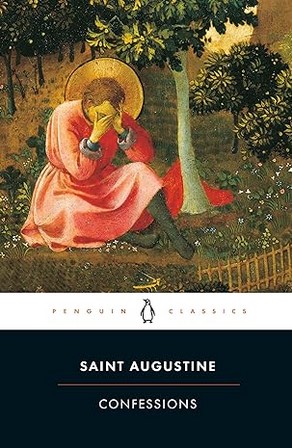
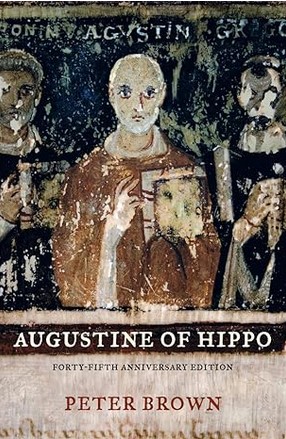
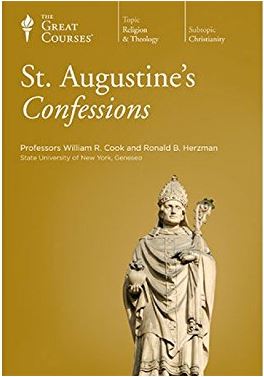
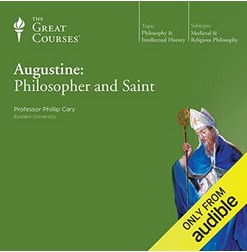
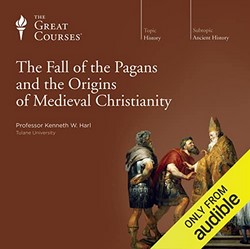
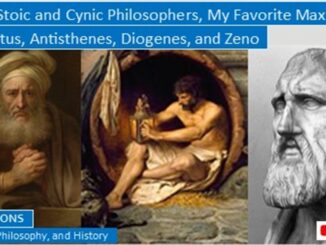


5 Trackbacks / Pingbacks